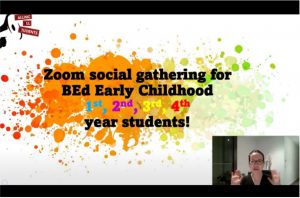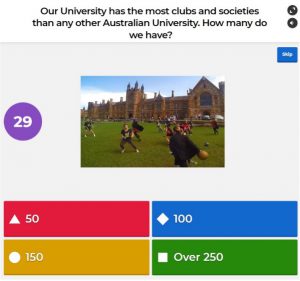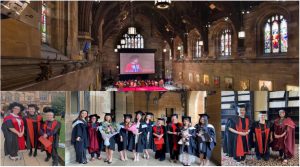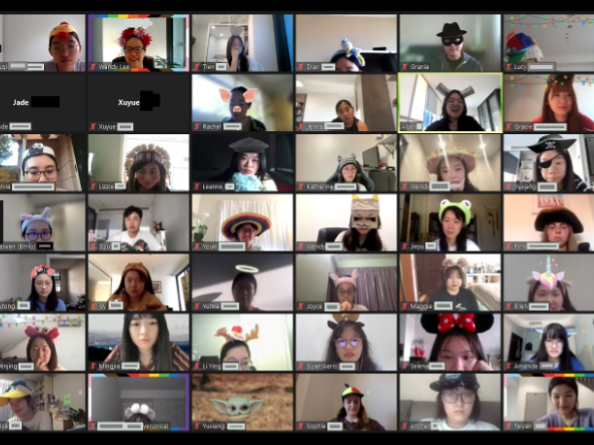Building a strong sense of belonging is key for student-centred teaching and learning and a core value in the Faculty of Arts and Social Sciences (FASS) pedagogical values framework, Online by Our Design (OBOD). However, with the last two years of teaching taking place mostly online, how can we foster a sense of belonging remotely?
Dr Wendy Lee is an Academic Fellow and Lecturer in Early Childhood, Student Life Coordinator (Early Childhood) and FASS Academic Advisor for the Sydney School of Education and Social Work. In the Early Childhood degree program student belonging was organically fostered by consistent contact with peers and teachers, semester to semester, year after year. With the shift online, Wendy sought ways to maintain these ‘special qualities’. In this article, Leanne Stevenson speaks with Wendy about how to host a successful social event for students online to help grow the sense of belonging for her students.
Leanne Stevenson: How has student life been affected in the shift to online learning?
Wendy Lee: Each year and cohort have very different needs. For example, for most first-year students it is their first time studying at university, and they’ve had very little to no face-to-face contact with other students and their tutors, lecturers, and professors. Students in their second year have had some on-campus learning experiences and started to build relationships with peers, with a sudden halt to these experiences. Students in third and fourth years have had a disruption to their normal study routine and placements. For both campus and remote students, it was important to find strategies to bridge the gap of online learning and meet the social needs of students. These needs were addressed in weekly tutorials through group discussions, discussion boards, group chats, small break out rooms, and small but effective approaches such as greeting each student by their name when they join Zoom.
But, I wanted a special event that would enable students to socialise in addition to their weekly tutorials, so I organised and ran our first-ever Zoom social gathering for over 114 early childhood students.
Leanne: What were the key qualities of belonging that guided your event? What are the longer-term benefits for a cohort of students?
Wendy: The purpose of the event was for students to gain a sense of belonging in their learning community. Furthermore, I wanted to give students an opportunity to make friends and to learn from each other. A good mix of students from different years (1st to 4th years) attended the social gathering. My goal was to look at the current needs of students, as well as the longer-term ‘post-online’ study experience of students.
When students do return to campus, I want students to feel a sense of familiarity and comfort in their educational context.
To maximise students’ engagement and provide a fulfilling study experience, I wanted students to build (or continue) their relationships with peers and have a smooth transition back to their on-campus learning in 2022. The key aspects that guided the social event were to bridge the students’ university experience, study, and wellbeing – and to have fun! I ran the same event twice – one for Bachelor of Education (Early Childhood) and one for Master of Teaching (Early Childhood) students. I invited all years as well as recent graduate students. As Sydney was in lockdown for most of semester two, this meant most first-year students have not met face to face or had the opportunity to make friends, on-campus students would not have seen their friends for several months, or their friends may have returned to their home countries. Thus, a sense of inclusion and belonging amongst the cohort was an important factor and drive for the event.
Leanne: What did you do? What kind of practical considerations should coordinators consider when planning a social event?

Wendy: Prior to the event, I informally asked students during tutorials how they would feel about a social event. Approximately 30-40% of students said they would like to join. After gathering the informal numbers, I devised a short ‘promotion’ video with slides and a video of myself explaining the event as a formal invitation to all early childhood students. Rather than posting the promotion video as an announcement or as an email attachment, to increase student participation I asked all early childhood UoS coordinators and tutors to play the video during class time. I also joined a few of the live Zoom tutorials to play the video and to reach out to students personally. I invited students to wear a crazy/funny hat to the event – this is quite a common event in early childhood centres when working with children, and just to make the event even more fun!

It was such a lovely, pleasant surprise to have 64% of the BEd cohort join the event. For the MTeach, 70% of students attended. During the event, I did an Acknowledgement of Country, followed by our two program directors, A/Professor Dr Marianne Fenech (BEd) and Dr Amanda Niland (MTeach). I also invited our early childhood student representative to introduce herself and her role. After exchanging greetings I ran a Kahoot game on fun facts about the University of Sydney as an ice breaker exercise. The students also played several rounds of charades, with questions relating to children’s fingerplays, songs, and stories. I had small prizes for students to win that were university related, including the University of Sydney key-rings, notebooks, pens, and mugs. There was also one special prize for the best crazy/funny hat, and students voted live on Padlet as to who they thought should win. This was a tough one, as we had some outstanding and extremely creative hats!

I had final year students as well as recent BEd and MTeach early childhood graduates give a short talk with tips on how to study effectively, how to maximise their engagement in their university life, on placement experiences, as well as sharing their experience of doing Honours. A recent graduate of our early childhood degree shared their wonderful experience of post-university life working as a full-time Teacher and Room Leader in an early childhood setting.
I showed photos of the early childhood academic staff attending graduation with early childhood students in 2021 and photos of the Great Hall which the students gave a lot of positive feedback on. Students noted that this gave them ‘hope’ and ‘motivation’ at a time when students were emotionally exhausted.
The event finished with a slideshow of iconic buildings and main facilities students may likely use (e.g. Fisher Library, Education Building, main lecture theatres) so that they develop (at the very least) a feeling of being on campus, and develop some familiarity for when they do return. I also provided links to support services available such as mental health and wellbeing support services for on-campus and offshore students, support materials for online study, the Learning Hub, Safer Communities, Disability Services, as well links to a virtual 360° University tour and clubs and societies students can join online.
Leanne: What activities or ideas worked the best, and what would you improve on for next time?
Wendy: The event prompted several emails from students with so much positive feedback. However, reflecting on the event, I felt as though I could have done a better job in keeping track of the comments/chat/question function. To address this issue, mid-way through, I asked the student representative to keep track of the responses by students and she did a marvellous job. Some students also noted that they would like a short, small breakout room session next time, so students have time to socialise. I think this would have been a great idea to incorporate as most students informed me that they used the private chat function to exchange email addresses and to find out which country/region they were in. A post-event survey would have greatly helped me in organising any future events, but I did not want the focal point of this event to be about doing any written work. But perhaps this would have been good to include at the conclusion of the event.
Although no written feedback was sought, several students gave uninitiated feedback via email. Some include:
- It was so nice to join your zoom gathering today! I thoroughly enjoyed the activities and meeting students from other cohorts. It was really inspiring! Again, thank you for hosting such a great event, I’m sure everyone loved it and would greatly support it if there’s another one in the future. (4th year BEd student)
- It was an amazing event, I am glad that I didn’t miss it! (1st year BEd student)
- Thank you for organising such an amazing party for us! (2nd year BEd student)
- Thank you so much for hosting the much needed event to connect the MTEACH cohort and boost up our spirits especially in these difficult times. I am pretty sure that a lot of us truly appreciate taking the time for arranging this! Thank you again!
(2nd year MTeachstudent)
A lot of time and effort went into organising this event, but the student’s engagement in the event and their feedback have been extremely rewarding. I am greatly thankful to the students, as well as our wonderful early childhood academic team!
Want to know more?
- Check out the Online by Our Design site to find out more about the innovative teaching practices in FASS





